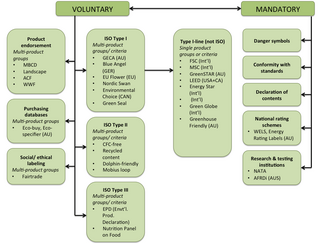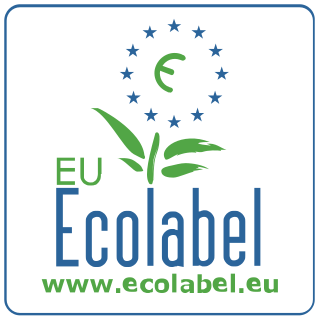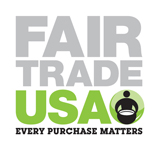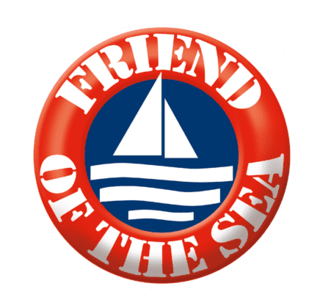 W
WEco-labels and Green Stickers are labeling systems for food and consumer products. Ecolabels are voluntary, but green stickers are mandated by law; for example, in North America major appliances and automobiles use Energy Star. They are a form of sustainability measurement directed at consumers, intended to make it easy to take environmental concerns into account when shopping. Some labels quantify pollution or energy consumption by way of index scores or units of measurement, while others assert compliance with a set of practices or minimum requirements for sustainability or reduction of harm to the environment. Many ecolabels are focused on minimising the negative ecological impacts of primary production or resource extraction in a given sector or commodity through a set of good practices that are captured in a sustainability standard. Through a verification process, usually referred to as "certification", a farm, forest, fishery, or mine can show that it complies with a standard and earn the right to sell its products as certified through the supply chain, often resulting in a consumer-facing ecolabel.
 W
WProposition 37 was a California ballot measure rejected in California at the statewide election on November 6, 2012. This initiative statute would have required labeling of genetically engineered food, with some exceptions. It would have disallowed the practice of labeling genetically engineered food with the word "natural." This proposition was one of the main concerns by the organizers of the March Against Monsanto in May 2013.
 W
WThe Blue Angel is an environmental label in Germany that has been awarded to particularly environmentally friendly products and services since 1978. The owner of the label is the Federal Ministry for the Environment, Nature Conservation, Building and Nuclear Safety.
 W
WIn Australia and New Zealand, an energy rating label or energy rating is a label affixed to various appliances prior to retail sale, which allows consumers to compare the energy efficiency of product and allows consumers to know how much power a particular model will use to run. They allow consumers to compare the energy consumption of similar products, and factor lifetime running cost into their purchasing decision. The energy rating label is a mandatory comparison label under Australian regulations for store sales but not for products sold online. The label comprises an energy consumption figure for the appliance and a star rating. The energy consumption figure is an estimate of how much energy the appliance will use over a year, based on assumptions about “average usage”.
 W
WEU Ecolabel or EU Flower is a voluntary ecolabel scheme established in 1992 by the European Commission.
 W
WThe European Vegetarian Union (EVU) is a non-profit, non-governmental umbrella organisation for vegetarian societies and groups in Europe. The union works in the areas of vegetarianism, nutrition, health, consumer protection, the campaign for animal rights, ecology, general information and against world hunger. Headquarters are in Winterthur (Switzerland), together with the Swiss organisation Swissveg.
 W
WFair Trade USA, formerly "TransFair USA", is a 501(c)(3) non-profit organization that sets standards, certifies, and labels products that promote sustainable livelihoods for farmers and workers and protect the environment.
 W
WThe Fairtrade certification initiative was created to form a new method for economic trade. This method takes an ethical standpoint, and considers the producers first.
 W
WFriend of the Sea is a project of the World Sustainability Organization for the certification and promotion of seafood from sustainable fisheries and sustainable aquaculture. It is the only certification scheme which, with the same logo, certifies both wild and farmed seafood.
 W
WThe Green Dot is the license symbol of a European network of industry-funded systems for recycling the packaging materials of consumer goods. The logo is trademark protected worldwide.
 W
WThe Nordic Ecolabel or Nordic swan is the official sustainability ecolabel for products from the Nordic countries. It was introduced by the Nordic Council of Ministers in 1989. The logo is based on the logo of the Nordic Council adopted in 1984 which symbolises trust, integrity and freedom. The Nordic Swan covers 67 different product groups, from hand soap to furniture to hotels.
 W
WOrganic certification is a certification process for producers of organic food and other organic agricultural products. In general, any business directly involved in food production can be certified, including seed suppliers, farmers, food processors, retailers and restaurants. A lesser known counterpart is certification for organic textiles that includes certification of textile products made from organically grown fibres.
 W
WPolarn O. Pyret is a Swedish children's clothing brand, based in Stockholm. Polarn O. Pyret designs, produces and distributes baby and childrenswear, and operates a chain of shops in Europe and the US. The name means "Buddy and The Little One" in Swedish, although it is often shortened to "PO.P".
 W
WThe Rainforest Alliance is an international non-governmental organization (NGO) with staff in more than 20 countries and operations in more than 70 countries. It was founded in 1987 by Daniel Katz, an American environmental activist, who serves as the chair of the board of directors. The NGO states that its mission is “to create a more sustainable world by using social and market forces to protect nature and improve the lives of farmers and forest communities.” Its work includes the provision of an environmental certification for sustainability in agriculture. In parallel to its certification program, the Rainforest Alliance develops and implements long-term conservation and community development programs in a number of critically important tropical landscapes where commodity production threatens ecosystem health and the well-bring of rural communities.
 W
WSustainable packaging is the development and use of packaging which results in improved sustainability. This involves increased use of life cycle inventory (LCI) and life cycle assessment (LCA) to help guide the use of packaging which reduces the environmental impact and ecological footprint. It includes a look at the whole of the supply chain: from basic function, to marketing, and then through to end of life (LCA) and rebirth. Additionally, an eco-cost to value ratio can be useful The goals are to improve the long term viability and quality of life for humans and the longevity of natural ecosystems. Sustainable packaging must meet the functional and economic needs of the present without compromising the ability of future generations to meet their own needs. Sustainability is not necessarily an end state but is a continuing process of improvement.
 W
WWashington Initiative 522 (I-522) "concerns labeling of genetically-engineered foods" and was a 2012 initiative to the Washington State Legislature. As certified by the Washington Secretary of State, it achieved enough signatures to be forwarded to the legislature for consideration during the 2013 session. The legislature did not vote on the initiative, so I-522 advanced to the November 5, 2013 general election ballot. If passed into law by voters, I-522 would have taken effect on July 1, 2015. The initiative failed with 51% opposition.